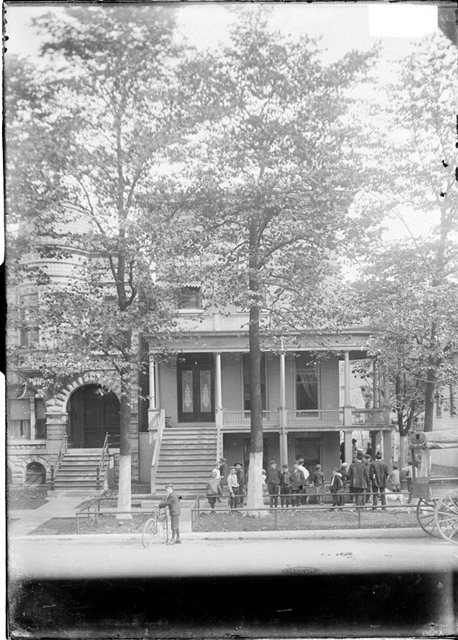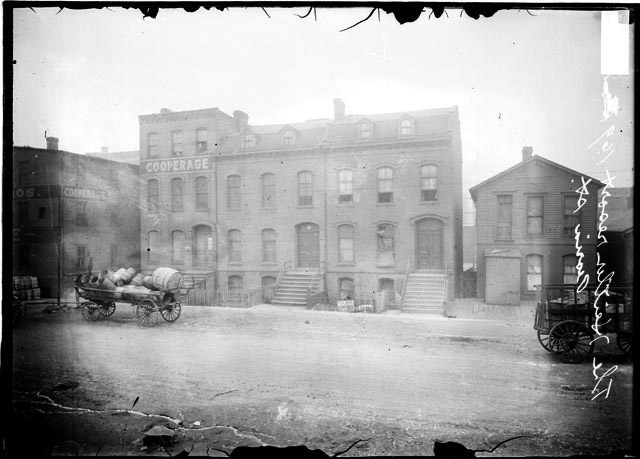|
Organized crime has existed
in Chicago for over a century, and actually originated well before
1919 - the year Prohibition was ratified as the 18th Constitutional
Amendment. It appears to be a trend for the criminal to make a business
out of any illegal activities that could possibly bring forth profit,
and "organized crime always seeks to commercialize and to exploit
human nature" (Landesco, 281).
Therefore, it is no surprise that gangsters found other lucrative
markets to extort before the illegalization of alcohol. Two of the
most common markets were prostitution,
and gambling.
Gambling
Gambling is an example of a business that was run and regulated
by gangsters with the intent of earning significant profits. Gambling
typically appeared in the forms of roulette, craps, various card
games including faro, and perhaps most popularly, betting on horse
races. The appeal to the gangster of managing gambling operations,
which were often disguised as pool halls, is partly due to the illegality
of gambling at the time, and also because the demand for such opportunities
was present in the city of Chicago. This demand was further amplified
by the hardships of the Depression because of the hopes these poor,
distraught Chicagoans had of being released from their troubles
by beating the odds and winning a big bet.
This desperation of lower class Chicagoans during the Depression,
and their turn to gambling in response to financial struggles, are
exemplified in Farrell's Studs Loningan. In this time period
when "collecting bills … [was] sure one hell of a job"
(Farrell, 586) and a father had
to resort to asking his son to borrow money, the bookie was flourishing
and experiencing the high-life. Phil Rolfe, the character who managed
a horse race betting joint, is such an example. Although many, including
Studs and his family, were forced out of work by the Depression,
Phil states that business was "really a little more than fair"
(Farrell, 665). While Mr. Lonigan's
painting business was going under, Phil Rolfe was expanding his
joint by adding "more space, more blackjack tables, a roulette
wheel, a table for poker and craps, and some nice looking furniture
… [while expecting] twice as much revenue" (Farrel,
665).
Although Phil Rolfe was not depicted in the novel Studs Lonigan
as a gangster, gambling joints such as the one he managed were often
organized and overseen by gangsters such as Al
Capone, or previously by gambling kings such as Mont Tennes
or James O'Leary. The successful operation of gambling joints was
limited to such gangsters belonging to powerful groups of organized
criminals, for it relied on the influence these groups had on the
government and police forces in Chicago. "Since gambling [was]
illegal, it [could not] exist except by defeating the law, which
[was] accomplished partly by influencing elections through contributions
to campaign funds or by the bribery of officials" (Landesco,
45). The immense profits that gangsters received from bootlegging
alcohol during Prohibition allowed them to offer more significant
bribes to a wider range of government agents, which allowed their
gambling circuits to become even more expansive, thus leading to
a revolution of this aspect of organized crime (Organized
Crime After Prohibition). This association of personnel of gambling
facilities was seen in Algren's The Man with the Golden Arm,
where Frankie and the police were both involved with Schwiefka's
business. This novel also illustrates the influence hustlers (a
general category that includes gangsters) had over the police when
Frankie is imprisoned. After the manager of the gambling joint Frankie
deals at speaks with city officials at the jail, he states to Frankie,
"What I said is you're gettin' out in half a hour 'n the super
hisself couldn't put the fix in faster" (Algren
1976, 24).
|

The
former residence of Mont Tennes at 632 West Belden Avenue
in Lincoln Park. Tennes clearly was quite a wealthy man from
his gambling profits (Citation).
|
Although
horse racetracks were eventually banned in Chicago in 1904 by
Mayor Carter Harrison II, betting on races still took place.
This was possible through John Payne's invention of a telegraph-wire
system to relay the results of horse races across the country
to specific gambling hideouts in Chicago. The inventor, a previous
employee of the Western Union Telegraph Company, sold this service
to Mont Tennes, who charged the managers of betting joints for
access to this information he controlled. Tennes thus monopolized
access to these horse race results and betting on horse races
altogether, which upset his competition. Because of the profits
involved in the gambling business, conflicts between Tennes'
gang and other gangs such as that of O'Leary led to war between
the gangs. However, for many years, Tennes was the victor, and
for this, he became a very rich mobster. Mont Tennes was forced
into retirement in the 1920's by Al Capone
and his gang. Capone, along with his massive earnings from bootlegging,
was able to buy off even the mayor of the city and propagate
his gambling business in the city and into the suburbs of Chicago
(Click here to read more
about organized crime in Chicago after Prohibition). |
Prostitution
Another example of an
illegal activity in which the gangster was heavily involved was
prostitution. In the city of Chicago, gangsters created, operated,
and managed hundreds of whorehouses, which often had the false front
of being a roadhouse, saloon, or resort. As suggested by Farrell's
Studs Loningan, these were a common part of life for many
a Chicagoan, especially younger adolescents such as Studs Lonigan,
who along with his gang of friends, were frequent customers. One
of the whorehouses these boys visit is named the "Cannonball
Inn", which is a cover for what actually occurs in the building
(Farrell, 300).
|

Above
is a picture of a whorehouse at 310 North Peoria Street in
Chicago during the early 1900's (Citation).
|
This aspect of organized
crime (prostitution) was also heavily dependent on affiliations
and alliances between the gangster, politician, and police officer.
Business, and the amount of profit received through prostitution
operations, fluctuated as different mayors came and passed, for
some could be bought out, and others could not. Mayor William
Hale Thompson was an example of the prior case, and during his
terms, gangster activities such as prostitution thrived. A December
issue of the Daily News in 1922 stated, "the lawless days of
the famous 'red-light' district when the demimonde and professional
gambler, under the appraising eye of the police, were once more
restored … where … Thompson political followers were in
absolute control" (Landesco, 39).
Jim Colosimo and John
Torrio were key figures in organizing prostitution in Chicago who
later passed the business to Al Capone.
Capone was not as favorable of vice as Colosimo and Torrio, so when
he took over the position of gang leader, he focused on other aspects
of organized crime such as gambling bootlegging, and labor
racketeering operations.
Other markets that organized
criminals were involved with before the start of Prohibition include
robbery, hijacking, and contract killing. These illegal activities
were not as profitable as gambling and prostitution, and were generally
side products of maintaining those rackets, rather than businesses
in and of themselves.
The onset of Prohibition
established a setting that could be taken advantage of by organized
criminals to the extent of leading to a revolution of crime to higher
levels of complexity and organization (Click here
for more). Additionally, "all the experience gained by years
of struggle against reformers and concealed agreements with politicians
was brought into service in organizing the production and distribution
of beer and whiskey" (Landesco,
43). Thus, gangsters' involvement with the businesses of gambling
and prostitution provided them with the skills and connections necessary
to successfully exploit Prohibition, and served as a 'training ground'
for such a large-scale activity.

|



